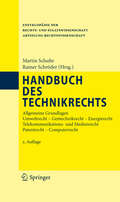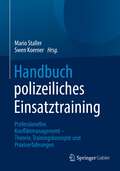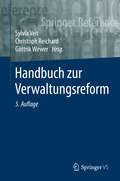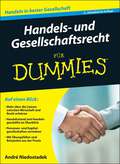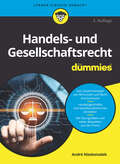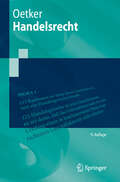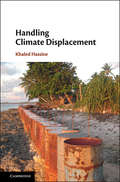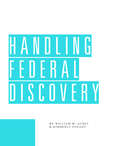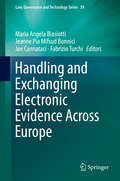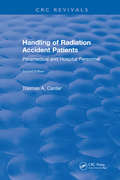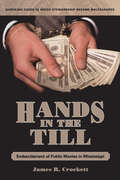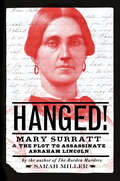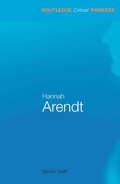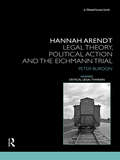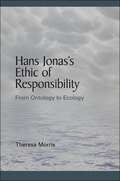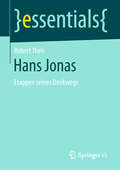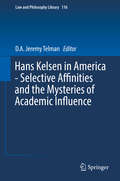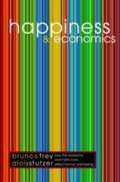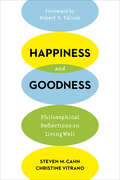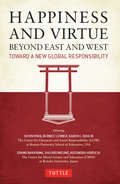- Table View
- List View
Handbuch des Technikrechts
by Martin Schulte Rainer SchröderDas Handbuch wendet sich an alle in Wissenschaft und Praxis mit dem Technikrecht befassten Juristen, die sich einen ersten vertieften Einblick in dieses neue Rechtsgebiet verschaffen wollen. Die Grundlagen des Technikrechts werden dargestellt; einzelne, besonders wichtige Bereiche des Technikrechts werden eingehend analysiert.
Handbuch polizeiliches Einsatztraining: Professionelles Konfliktmanagement – Theorie, Trainingskonzepte und Praxiserfahrungen
by Mario Staller Swen KoernerDieses Buch bietet Einsatztrainer*innen, Polizist*innen, Entscheider*innen und Wissenschaftler*innen einen praktischen und evidenzbasierten Zugang zum Thema des polizeilichen Einsatztrainings. Im Mittelpunkt dieses Handbuches steht der Trainingsprozess des Einsatztrainings. Drei Perspektiven bilden dabei den Rahmen des Werkes:Die akademische Perspektive richtet sich an Einsatztrainer*innen, Wissenschaftler*innen und polizeiliche Entscheider*innen und bringt aktuelle Forschungsergebnisse zum Einsatztraining mit- und gegeneinander ins Gespräch. Die praktische Perspektive bietet Einsatztrainer*innen Fallbeispiele aus der polizeilichen Trainingspraxis. So erhalten Praktiker*innen neue Möglichkeiten zur Gestaltung und Reflexion des eigenen Trainings.Die in der Verflechtung beider Sichtweisen entstehende prakademische Perspektive gibt Praktiker*innen Anhaltspunkte zur Gestaltung und Reflexion des Einsatztrainings auf evidenzbasierter wissenschaftlicher Basis.Der Bogen der behandelten Themen spannt sich von innovativen Theoriemodellen und neueren Trainingsanforderungen bis hin zu praktischen Einsatzanforderungen.Die Leser*innen finden in diesem Handbuch wertvolle Anregungen für die Bewältigung des herausfordernden Polizeialltags.
Handbuch zur Verwaltungsreform (Springer Reference Sozialwissenschaften Ser.)
by Göttrik Wewer Sylvia Veit Christoph ReichardDas Thema Verwaltungsreform beschäftigt nach wie vor Bund, Länder und Gemeinden gleichermaßen. Konzeptionell sind die diskutierten Ansätze und Instrumente einem ständigen Wandel unterworfen und bei der Umsetzung von Maßnahmen besteht in großem Maße Unsicherheit und Orientierungsbedarf. Das Handbuch liefert einen Beitrag zur Einordnung unterschiedlicher Konzepte und Orientierung für die Umsetzung der Verwaltungsreform. In 66 Beiträgen werden vielfältige Ansätze der Verwaltungsreform vorgestellt, ihr Entstehungszusammenhang erläutert, praktische Anwendungsfelder beschrieben und Entwicklungsperspektiven untersucht. Die Beiträge stammen von renommierten WissenschaftlerInnen und erfahrenen PraktikerInnen. Themenblöcke: Staat und Verwaltung, Reform- und Managementkonzepte, Steuerung und Organisation, Personal, Finanzen, Ergebnisse und Wirkungen, Erfahrungen und Perspektiven. Die Hälfte der Beiträge dieser Auflage wurde komplett neu geschrieben und die restlichen Beiträge wurden gründlich überarbeitet.
Handels- und Gesellschaftsrecht für Dummies (Für Dummies)
by André NiedostadekDas Handels-und Gesellschaftsrecht ist für jeden wichtig, der sich mit Wirtschaft beschäftigt. Aber gerade Nicht-Juristen tun sich mit diesem Stoff schwer. Deshalb hat André Niedostadek dieses Buch speziell für Jura-Einsteiger geschrieben, die sich in ihrem Studium mit dem Handels- und Gesellschaftsrecht befassen müssen. Im Handelsrecht erklärt er Ihnen Wissenswertes zum Handelsstand und zu den Handelsgeschäften, im Gesellschaftsrecht geht er auf Personen- und Kapitalgesellschaften ein. Ergänzend finden Sie eine Einführung in die Falllösung und eine Reihe von Übungsfällen inklusive Beispiellösungen. So sind Sie für Prüfung bestens gewappnet.
Handels- und Gesellschaftsrecht für Dummies (Für Dummies)
by André NiedostadekDas Handels-und Gesellschaftsrecht ist für jeden wichtig, der sich mit Wirtschaft beschäftigt. Aber gerade Nicht-Juristen tun sich mit diesem Stoff schwer. Deshalb hat André Niedostadek dieses Buch speziell für Jura-Einsteiger geschrieben, die sich in ihrem Studium mit dem Handels- und Gesellschaftsrecht befassen müssen. Im Handelsrecht erklärt er Ihnen Wissenswertes zum Handelsstand und zu den Handelsgeschäften, im Gesellschaftsrecht geht er auf Personen- und Kapitalgesellschaften ein. Ergänzend finden Sie eine Einführung in die Falllösung und eine Reihe von Übungsfällen inklusive Beispiellösungen. So sind Sie für Prüfung bestens gewappnet.
Handelsrecht (Springer-Lehrbuch)
by Hartmut OetkerDas Lehrbuch konzentriert sich auf die Grundstrukturen des Handelsrechts und diejenigen Bereiche, die in den Prüfungen von allen Studierenden beherrscht werden müssen. Deshalb stehen vor allem die Schnittstellen des Handelsrechts zum Bürgerlichen Recht im Zentrum des Lehrbuchs. Die wechselseitigen Verzahnungen verdienen besonderes Augenmerk. Die Stoffkonzentration und die Bezüge zu den anderen Pflichtfächern trainieren das Verständnis für das Zusammenwirken der verschiedenen Rechtsnormen in einer dem Anspruch auf „Einheit“ gerecht werdenden Rechtsordnung.
Handelsrecht (Springer-Lehrbuch)
by Hartmut OetkerDas Lehrbuch konzentriert sich auf die Grundstrukturen des Handelsrechts und diejenigen Bereiche, die in den Prüfungen von allen Studierenden beherrscht werden müssen. Deshalb stehen vor allem die Schnittstellen des Handelsrechts zum Bürgerlichen Recht im Zentrum des Lehrbuchs. Die wechselseitigen Verzahnungen verdienen besonderes Augenmerk. Die Stoffkonzentration und die Bezüge zu den anderen Pflichtfächern trainieren das Verständnis für das Zusammenwirken der verschiedenen Rechtsnormen in einer dem Anspruch auf „Einheit“ gerecht werdenden Rechtsordnung. Die 9. Auflage berücksichtigt insbesondere die im Kaufrecht sowie infolge des Gesetzes zur Modernisierung des Personengesellschaftsrechts (MoPeG) eingetretenen Rechtsänderungen.
Handling Climate Displacement
by Khaled HassineHow do we begin to handle the greatest crisis affecting humanity today? Climate change is already causing droughts, flooding, and famine that are forcing people to leave their livelihoods and communities. In the years to come, millions will find their local areas uninhabitable, as mass displacement of people reaches disastrous levels. Handling Climate Displacement explains how climate change has become recognized as a human rights concern, and how human rights are key to managing the crisis. Local authorities and populations increasingly call for guidance in the absence of an internationally recognized framework. Drafted in 2013 by a committee of experts and practitioners, Hassine uses the Peninsula Principles on Climate Displacement within States to offer concrete solutions to the impending emergency. Enriched by the author's experience working with the victims of climate displacement, this book offers an effective framework to deal with the challenges presented by mass displacement while protecting human rights.
Handling Federal Discovery
by William Audet Kimberly FanadyHandling Federal Discovery Strengthen your discovery work with William Audet and Kimberly Fanady's Handling Federal Discovery. Walk step-by-step through every discovery task, from setting discovery goals to deposing expert witnesses. The book's unique task outline format provides practical instruction and sophisticated strategies that help you handle your opponent's tricks and delay tactics. Organized by preparation task, it literally gives you the what, why, when, and how of moving a case through discovery, complete with practice tips and forms: * What and why -- The task is explained in plain English, detailing related rules and case law, along with the reasons for considering the task. * When -- A thorough discussion of the steps to be completed prior to beginning the task, along with deadlines for the task. * How -- The meat of the book, this section details each step necessary to effectively complete the task. Includes defenses against the efforts of your opponent. * Practice notes -- Here you will find strategies, arguments, cautions, and advice learned from decades in the courtroom. * Forms -- Discovery motions, documents, letters, and memoranda. Handling Federal Discovery gives you broad, organized coverage of essential federal discovery rules, practice tips and necessary forms that are applicable in federal and many state courts.
Handling and Exchanging Electronic Evidence Across Europe (Law, Governance and Technology Series #39)
by Maria Angela Biasiotti Jeanne Pia Mifsud Bonnici Joe Cannataci Fabrizio TurchiThis volume offers a general overview on the handling and regulating electronic evidence in Europe, presenting a standard for the exchange process. Chapters explore the nature of electronic evidence and readers will learn of the challenges involved in upholding the necessary standards and maintaining the integrity of information. Challenges particularly occur when European Union member states collaborate and evidence is exchanged, as may be the case when solving a cybercrime. One such challenge is that the variety of possible evidences is so wide that potentially anything may become the evidence of a crime. Moreover, the introduction and the extensive use of information and communications technology (ICT) has generated new forms of crimes or new ways of perpetrating them, as well as a new type of evidence. Contributing authors examine the legal framework in place in various EU member states when dealing with electronic evidence, with prominence given to data protection and privacy issues. Readers may learn about the state of the art tools and standards utilized for treating and exchanging evidence, and existing platforms and environments run by different Law Enforcement Agencies (LEAs) at local and central level. Readers will also discover the operational point of view of LEAs when dealing with electronic evidence, and their requirements and expectations for the future. Finally, readers may consider a proposal for realizing a unique legal framework for governing in a uniform and aligned way the treatment and cross border exchange of electronic evidence in Europe. The use, collection and exchange of electronic evidence in the European Union context and the rules, practises, operational guidelines, standards and tools utilized by LEAs, judges, Public prosecutors and other relevant stakeholders are all covered in this comprehensive work. It will appeal to researchers in both law and computer science, as well as those with an interest in privacy, digital forensics, electronic evidence, legal frameworks and law enforcement.
Handling of Radiation Accident Patients: by Paramedical and Hospital Personnel Second Edition
by Thomas A. CarderThis book provides guidelines, procedures, and techniques for emergency support personnel involved with handling radiation accident patients. Prepared by a former emergency medical responder, this book amplifies the level of radiological response training provided to emergency medical technicians and emergency room physicians and nurses. Supporting graphics, references, and a glossary help readers understand the critical aspects of emergency trauma treatment.
Handlungsformen und gerichtlicher Rechtsschutz im Informationsfreiheitsrecht
by Claudia BendischDie Entwicklung von Gesetzen und Regelungen im Informationsverwaltungsrecht in Deutschland schreitet seit den neunziger Jahren stetig voran und dauert bis heute an. Das Buch bildet das IFG, VIG, UIG des Bundes sowie die dreizehn vorhandenen Informationsfreiheitsgesetze der Länder im Hinblick auf die gerichtliche Rechtsdurchsetzung des Informationszugangsanspruchs ab. Es ergibt sich eine Grundsystematik der Rechtsschutzorganisation. Auch im Rahmen der Anspruchsverpflichteten und deren Handlungsformbefugnis lassen sich Regelungstypen finden. Für die Bestimmung des Rechtswegs und der statthaften Klageart zur Durchsetzung des Informationszugangsanspruchs spielen aber auch gesetzliche Handlungsformgebote sowie die generelle Verteilung der Gesetzgebungskompetenzen für das Verwaltungsprozessrecht zwischen Bund und Ländern eine bedeutende Rolle. Das Zusammenwirken dieser verschiedenen Aspekte führt im Ergebnis zu unterschiedlichen Einzellösungen für die gerichtliche Durchsetzung des Informationsanspruchs. Stellenweise ergeben sich Anwendungsprobleme bei der Bestimmung des Rechtswegs und der staathaften Klageart. Das Buch zeigt diese auf und gibt Empfehlungen für zukünftige gesetzliche Ausgestaltungen
Hands in the Till: Embezzlement of Public Monies in Mississippi
by James R. CrockettIn 2004 the Corporate Crime Reporter asserted that Mississippi was the most crooked state in America. By comparing the number of federal corruption convictions over the past decade and the 2002 population of the state, the conclusion was inescapable. Too many officials were robbing the public they had sworn to serve and protect. Hands in the Till: Embezzlement of Public Monies in Mississippi establishes the scope of a major crisis in a poor state where needs are many and funds are scarce. The book highlights the tireless work of the Office of the State Auditor in investigating the theft of public money and bringing criminals to justice. This book reports on thirty-seven cases that demonstrate how and why embezzlement occurs, how it is discovered and investigated, and how the state’s justice system deals with perpetrators. The greedy schemes can be as outrageous as they are disheartening. Case histories narrated here involve a variety of public servants and others including chancery clerks, circuit clerks, justice court clerks, city clerks, sheriffs, tax collectors, school and college administrators, and employees of organizations that receive public money.
Hanged!: Mary Surratt and the Plot to Assassinate Abraham Lincoln
by Sarah MillerFrom the critically acclaimed author of The Borden Murders comes the thrilling story of Mary Surratt, the first woman to be executed by the US government, for her alleged involvement in the plot to assassinate Abraham Lincoln.A dubious distinction belongs to Mary Surratt: on July 7, 1865, she became the first woman to be executed by the United States government, accused of conspiring in the plot to assassinate not only President Abraham Lincoln, but also the vice president, the secretary of state, and General Grant. Mary Surratt was a widow, a Catholic, a businesswoman, a slave owner, a Union resident, and the mother of a Confederate Secret Service courier. As the proprietor of the boardinghouse where John Wilkes Booth and his allies are known to have gathered, Mary Surratt was widely believed, as President Andrew Johnson famously put it, to have &“kept the nest that hatched the egg.&” But did Mrs. Surratt truly commit treason by aiding and abetting Booth in his plot to murder the president? Or was she the victim of a spectacularly cruel coincidence? Here is YA nonfiction at its best--gripping, thought-provoking, and unputdownable.
Hanging Devils
by He JiahongEarly 1990s China: Newly returned from the US, lawyer Hong Jun has just set up practice in a fledgling legal system when his first case walks through the door. 10 years ago a local beauty was killed on a state-owned farm in China's frozen northeast, and the police rushed to pin the crime on a likely culprit. Was the right man put away for the crime? In his struggle to uncover the truth, Hong Jun ruffles more than a few feathers. As many races to cash in on China's glittering future, he is forced to challenge those who put personal ambition above the rule of law—and those who will do anything to hide the sins of the past. In the finest tradition of international crime fiction, Hanging Devils is a gripping novel inspired by real events.
Hannah Arendt (Routledge Critical Thinkers)
by Simon SwiftHannah Arendt's work offers a powerful critical engagement with the cultural and philosophical crises of mid-twentieth-century Europe. Her idea of the banality of evil, made famous after her report on the trial of the Nazi war criminal, Adolf Eichmann, remains controversial to this day. In the face of 9/11 and the 'war on terror', Arendt's work on the politics of freedom and the rights of man in a democratic state are especially relevant. Her impassioned plea for the creation of a public sphere through free, critical thinking and dialogue provides a significant resource for contemporary thought. Covering her key ideas from The Origins of Totalitarianism and The Human Condition as well as some of her less well-known texts, and focussing in detail on Arendt's idea of storytelling, this guide brings Arendt's work into the twenty-first century while helping students to understand its urgent relevance for the contemporary world.
Hannah Arendt: Legal Theory and the Eichmann Trial (Nomikoi: Critical Legal Thinkers)
by Peter BurdonHannah Arendt is one of the great outsiders of twentieth-century political philosophy. After reporting on the trial of Nazi war criminal Adolf Eichmann, Arendt embarked on a series of reflections about how to make judgments and exercise responsibility without recourse to existing law, especially when existing law is judged as immoral. This book uses Hannah Arendt’s text Eichmann in Jerusalem to examine major themes in legal theory, including the nature of law, legal authority, the duty of citizens, the nexus between morality and law and political action.
Hannah Arendt: The Illegitimacy of Violence (Peacemakers)
by Ramin JahanbeglooThis book presents an original understanding of Arendt in the context of comparative political theory. The author discusses Arendt’s acute and perceptive view of violence as well as practical applications of her thought in a comparative context.The book examines Hannah Arendt’s ideas about politics and violence provoked by the horrors of totalitarianism. It applies the rich potential of Arendt’s insights to the wider cultural context and discourse of nonviolence. Through case studies of India and Iran, it presents a new way of reading Arendt’s understanding and critique of violence beyond the simple analysis of her work on power and violence.An original, nuanced and meaningful guide to Hannah Arendt, the book will be essential reading for students and scholars in politics, philosophy and peace and conflict studies.
Hans Jonas's Ethic of Responsibility: From Ontology to Ecology (SUNY series in Environmental Philosophy and Ethics)
by Theresa MorrisDespite his tremendous impact on the German Green Party and the influence of his work on contemporary debates about stem cell research in the United States, Hans Jonas's (1903–1993) philosophical contributions have remained partially obscured. In particular, the ontological grounding he gives his ethics, based on a phenomenological engagement with biology to bridge the "is-ought" gap, has not been fully appreciated. Theresa Morris provides a comprehensive overview and analysis of Jonas's philosophy that reveals the thread that runs through all of his thought, including his work on the philosophy of biology, ethics, the philosophy of technology, and bioethics. She places Jonas's philosophy in context, comparing his ideas to those of other ethical and environmental philosophers and demonstrating the relevance of his thought for our current ethical and environmental problems. Crafting strong supporting arguments for Jonas's insightful view of ethics as a matter of both reason and emotion, Morris convincingly lays out his account of the basis of our responsibilities not only to the biosphere but also to current and future generations of beings.
Hans Jonas: Etappen seines Denkwegs (essentials)
by Robert TheisDieses essential widmet sich dem Werk des Philosophen Hans Jonas und zwar aus dem Blickwinkel der Entwicklung seines Denkens. Die frühen Studien über die spätantike Gnosis bilden den Ausgangspunkt. Hier stößt Jonas auf ein Thema, das er in seinem gesamten späteren Werk kritisch diskutiert, nämlich das des weltfeindlichen Dualismus. In den ab den 1940er-Jahren entworfenen Studien zu einer philosophischen Biologie wird der Versuch unternommen, den Menschen in seiner leib-geistigen Verfasstheit bis hin zu seinen höchsten symbolischen Ausdrucksformen aus dem Prozess der gesamten Evolution heraus zu deuten und damit implizit die Weltfeindlichkeit der Gnosis zu widerlegen. In seiner Ethik der Verantwortung, die er in dem 1979 veröffentlichten berühmten Prinzip Verantwortung systematisch vorträgt, findet sich gleichsam die ethische Seite der Überwindung der Gnosis, nämlich, dass der Mensch Verantwortung für eine Welt zu übernehmen habe, in der auch zukünftige Generationen menschenwürdig leben können. In seinen letzten metaphysisch-theologischen Vermutungen dann wird die Problematik der Verantwortung mit Blick auf einen in der Schöpfung selber werdenden Gott hin thematisiert.
Hans Kelsen in America - Selective Affinities and the Mysteries of Academic Influence
by D.A. Jeremy TelmanThis volume explores the reasons for Hans Kelsen'slack of influence in the United States and proposes ways in which Kelsen'sapproach to law, philosophy, and political, democratic, and internationalrelations theory could be relevant to current debates within the U. S. academyin those areas. Along the way, the volume examines Kelsen's relationship andoften hidden influences on other members of the mid-century Central Europeanémigré community whose work helped shape twentieth-century social science in theUnited States. The book includes majorcontributions to the history of ideas and to the sociology of the professionsin the U. S. academy in the twentieth century. Each section of the volumeexplores a different aspect of the puzzle of the neglect of Kelsen's work invarious disciplinary and national settings. Part I provides reconstructions of Kelsen's legal theory and defendsthat theory against negative assessments in Anglo-American jurisprudence. Part II focuses both on Kelsen's theoreticalviews on international law and his practical involvement in the post-wardevelopment of international criminal law. Part III addresses Kelsen's theories ofdemocracy and justice while placing him in dialogue with other majortwentieth-century thinkers, including two fellow émigré scholars, Leo Straussand Albert Ehrenzweig. Part IV explores Kelsen's intellectual legacies throughEuropean and American perspectives on the interaction of Kelsen's theoreticalapproach to law and national legal traditions in the United States and Germany. Each contribution features a particularapplications of Kelsen's approach to doctrinal and interpretive issuescurrently of interest in the legal academy. The volume concludes with two chapters on the nature of Kelsen's legaltheory as an instance of modernism.
Happiness And Economics: How the Economy and Institutions Affect Human Well-Being
by Bruno S. Frey Alois StutzerCuriously, economists, whose discipline has much to do with human well-being, have shied away from factoring the study of happiness into their work. Happiness, they might say, is an ''unscientific'' concept. This is the first book to establish empirically the link between happiness and economics--and between happiness and democracy. Two respected economists, Bruno S. Frey and Alois Stutzer, integrate insights and findings from psychology, where attempts to measure quality of life are well-documented, as well as from sociology and political science. They demonstrate how micro- and macro-economic conditions in the form of income, unemployment, and inflation affect happiness. The research is centered on Switzerland, whose varying degrees of direct democracy from one canton to another, all within a single economy, allow for political effects to be isolated from economic effects.
Happiness and Goodness: Philosophical Reflections on Living Well
by Christine Vitrano Steven CahnHow should we evaluate the success of each person's life? Countering the prevalent philosophical perspective on the subject, Steven M. Cahn and Christine Vitrano defend the view that our well-being is dependent not on particular activities, accomplishments, or awards but on finding personal satisfaction while treating others with due concern.The authors suggest that moral behavior is not necessary for happiness and does not ensure it. Yet they also argue that morality and happiness are needed for living well, and together suffice to achieve that goal. Cahn and Vitrano link their position to elements within both the Hellenistic and Hebraic traditions, in particular the views of Epicurus and lessons found in the Book of Ecclesiastes. Written in an accessible style and illustrated with incisive vignettes drawn from history, literature, films, and everyday life, Happiness and Goodness is a compelling work of philosophy for anyone who seeks to understand the nature of a good life.
Happiness and Goodness: Philosophical Reflections on Living Well
by Steven M. Cahn Christine Vitrano&“A phenomenal book that offers innovative and penetrating insights into the most fundamental questions of human concern . . . vivid and enjoyable.&”—Dov Weiss, University of Illinois at Urbana-Champaign How should we evaluate the success of each person&’s life? Countering the prevalent philosophical perspective on the subject, Steven M. Cahn and Christine Vitrano defend the view that our well-being is dependent not on particular activities, accomplishments, or awards but on finding personal satisfaction while treating others with due concern. The authors suggest that moral behavior is not necessary for happiness and does not ensure it. Yet they also argue that morality and happiness are needed for living well, and together suffice to achieve that goal. Cahn and Vitrano link their position to elements within both the Hellenistic and Hebraic traditions, in particular the views of Epicurus and lessons found in the Book of Ecclesiastes. Written in an accessible style and illustrated with incisive vignettes drawn from history, literature, films, and everyday life, Happiness and Goodness is a compelling work of philosophy for anyone who seeks to understand the nature of a good life. &“Reminds me of a Socratic dialogue. The absence of jargon and use of realistic examples in this book make philosophy accessible to all interested in improving their lives.&”—Andrea Tschemplik, American University &“This crisply written and incisive book draws on ancient thought and contemporary examples to develop a compelling account of living well.&”—David Shatz, Yeshiva University &“I can&’t remember the last time I read a book about ethics that was so fascinating.&”—Ed Lake, deputy editor, Aeon
Happiness and Virtue Beyond East and West
by Kevin Ryan Karen E. Bohlin Osamu Nakayama Kazunobu Horiuchi Bernice LernerHappiness and Virtue Beyond East and West presents an important series of essays from Japanese and American authors examining essential virtues shared by both Eastern and Western cultures with the ultimate goal of allowing happiness to be realized in a globally and socially responsible manner.Each chapter examines one of nine virtues-Courage, Justice, Benevolence, Gratitude, Wisdom, Reflection, Respect, Responsibility and Temperance-and the importance of each in our lives.With clarity of purpose the essays demonstrate that the virtues and happiness that living a good life can bring know no national boundaries. It is the sincere hope of the editors and authors that this book will help its readers reexamine the timeless question of what constitutes true happiness and a good life and will therefore play some part in increasing international cooperation and good will.
